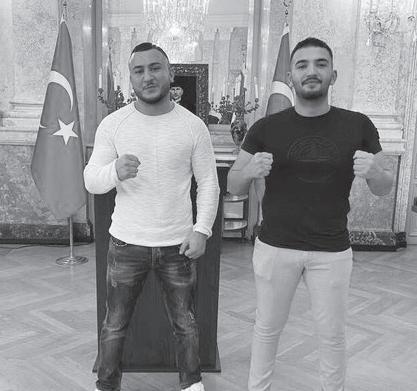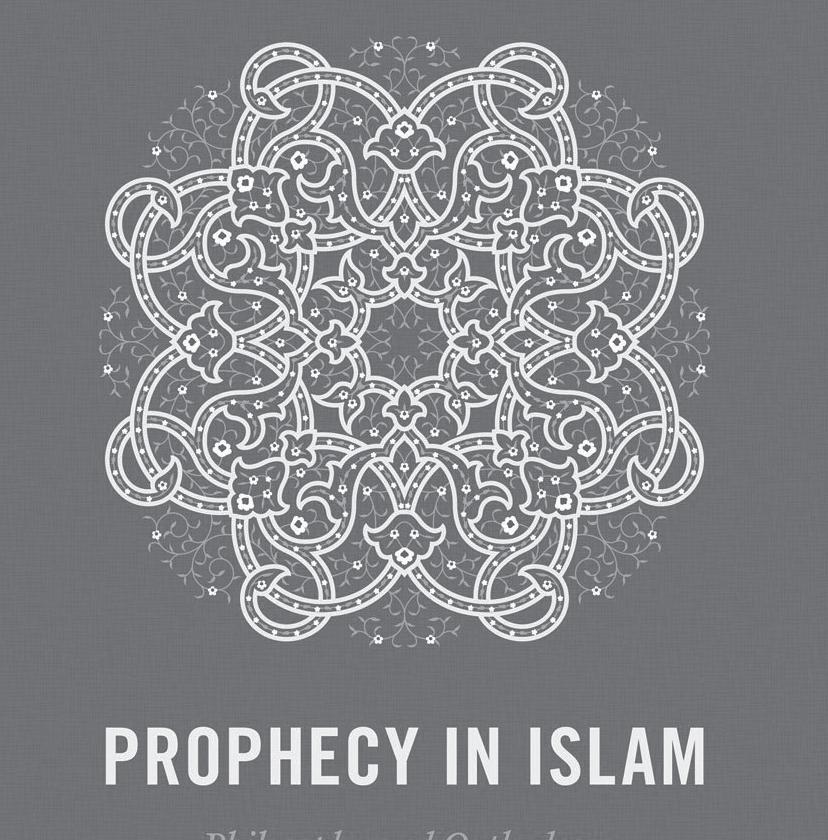5
Rabi ul Awaal 19,1442 Nov 6, 2020
f aith
Narrated `Abdullah bin Buhaina:
Allah’s Messenger (SAW) got up after the second rak`a of the Zuhr prayer without sitting in between (the second and the third rak`at). When he finished the prayer he performed two prostrations (of Sahu) and then finished the prayer with Taslim.
By: Walid A. Saleh
Prophecy and revelation in Islam
M
uhamm a d is the Prophet of Islam. Professor Walid Saleh explains the role of prophecy in Islam, discussing the primacy of the Prophet Muhammad and his life, as well as exploring other biblical and Arabian prophets present in the Qur’an, and the tradition of literature about them. When the Qur’an summarises the points that a Muslim must accept as a matter of faith, the list includes: belief in the Oneness of God (tawhid), in angels, in prophecy (nubuwwah) and in revelation (wahy). Muslims also have to believe in resurrection and judgement. There are three major players in the Qur’an: God who wants to guide humanity, humanity who are ignorant of God and the prophets and messengers who are selected by God to communicate his word to humanity. Prophets are thus the most important part of human history in the Qur’an, and Islam.
What is the Islamic view of prophecy?
Prophecy is seen by Muslims as an essential part of human history. God, Muslims believe, has always chosen individuals to communicate with, and He then ‘sends’ these prophets to a specific community to convey His words and will. Prophets are thus chosen by God as messengers (rasul), who convey a message (risalah). God speaks to these messengers in various ways, mostly by a process called inspiration (wahy). There are two terms for the word prophet in Arabic, rasul, messenger, and nabi, prophesier. It is understood that some prophets are given books (kitab), which gather the revelation or the messages proclaimed by a prophet. These books contain the preaching of the prophet concerned, on behalf of God. These books are thus the word of God. Prophets are fully human, they eat and sleep, and some marry and have children. Some have the ability to perform miracles, acts that break the laws of nature, such as making rocks gush with water, splitting the sea or resurrecting the dead. Muhammad, according to Muslims, split the moon into two halves and ascended to Heaven one night to meet God.
At the age of forty Muhammad started to experience visions and hear revelations. He soon realised that he had been chosen for a task: to preach to his own tribe about the one true God. Muhammad wanted his people to stop worshipping many gods and worship the one true God, the creator of the universe. When he started preaching very few people believed in him, and even when he performed miracles people accused him of being a magician and possessed by demons. Muhammad preached to his tribe for ten years, but he never succeeded in converting them. Eventually they wanted to kill him, and he migrated to another city, Medina (previously called Yathrib).
tells the story of prophets and their preaching. Most of the preaching of the prophets is about two major issues. The first is that the world is created by one God, and people should worship this true God. The other is that people should behave morally and not harm each other, feeding the poor, looking after orphans, not stealing or being greedy, not killing, not swearing falsely and being kind and loving to one’s parents. The Qur’an through the prophets is telling humanity that our worth is based on how good we are as human beings. Those who do good deeds and believe in the one true God will be saved and rewarded.
The migration to Medina is called Hijrah in Arabic. This became the most important point in the life of Muhammad, and the year Muhammad migrated to Medina is the beginning of the Muslim calendar. Muslims started counting years from that year, corresponding to 622 CE. In Medina Muhammad wrote a treaty with the inhabitants of the city, including its Jewish tribes. This treaty is called the Constitution of Medina. It declares that the Muslims are a nation, a religious community (ummah) and that Medina is a religious shrine and a holy city. Muhammad became the leader of his new community in Medina, which then began to grow, and conquered his native city, Mecca. Eventually, Muhammad became the most powerful leader in Arabia and the tribes accepted his position as a prophet and as the head of the community. Muhammad left for the Muslims two major items: the Qur’an, which has the word of God as revealed to Muhammad, and the notion of the Muslims as being a nation or a community united under one God. Although Muhammad performed other miracles, his most important miracle is the Qur’an. It is seen as both the message of God to humanity and the miracle that points to the truth of this message.
many of the same figures also feature, such as Ibrahim (Abraham, the father of all the prophets), Musa (Moses, the leader of the Israelites), Yusuf (Joseph) and Isa (Jesus), the prophet before Muhammad. The Qur’an believes that the core message of all the prophets is the same: as carriers of revelation they came to declare that there is one God, the creator and preserver of the universe, and that human beings have to worship and submit to His will. Islam, meaning ‘submission’ to God, is seen as the core message of all the prophets sent by God. There are several narrative similarities between the Qur’an and its biblical forerunners: it shares the same story about the creation of the world with the Hebrew Bible, it also shares with the New Testament the idea that the world will come to an end, followed by a resurrection of the dead and a judgement that will see humanity divided into the damned in Hell and the saved in Paradise. Along with Abraham, the Qur’an features the stories of several of the Patriarchs in the Old Testament, Noah, David and Solomon. Their stories in the Qur’an, however,
Biblical prophets When did the religion of Islam begin As the Qur’an shares many of the same stories as the Bible it is not surprising that to flourish?
differ on details, and more importantly on the significance of these stories and what they mean to future generations. Mostly, the story is presented as a failed attempt to convince a people to obey God. The stories are told in the Qur’an to convince people that God wants the best for human beings, and the best way to be saved is to follow the prophets that God sends them. Each community gets the chance to have a prophet and hear through him about the one God. People who obey this prophet are saved, those who do not are usually destroyed.
Arabian prophets
In addition to familiar names from the Bible, the Qur’an has stories about tribes of Arabia, ancient Arab tribes that have since disappeared from history. These tribes had never received the Word of God before, but were seen as part of God’s plan for humanity. Thus each deserved a prophet to tell them about God. Two Qur’anic prophets are Hud and Salih. Hud was sent to the people of Aad, a prosperous but proud civilisation. He preached about the one true God, but his people derided him and continued to worship their gods and put their faith in earthly goods and riches. As punishment God sent a tremendous storm that destroyed Aad. Salih was sent to the tribe of Thamud, who came after the people of Aad. He brought a blessed camel to them as a miracle, which they were asked not to harm. The people killed the camel and refused to believe in God. God punished them with an earthquake. The stories in the Qur’an are thus also meant to warn people not to disobey God.
What place do these prophets have in Islam?
In addition to the Qur’an, Muslims started to tell the stories of these prophets in more detail, expanding on the narrative contained in the scripture. A distinct genre of extraQur’anic tradition developed, with collections of stories proving among the most
To be continued at page 7
Prayer Schedule in Greater Vancouver
Nov 6-20, 2020-Rabi ul Awaal 19-R.U II-4,1442 H How does Muhammad inspire MusMuhammad was a messenger chosen by lims today? Isl. Dt. Day Date Fajar Sunr Dhur ZawalAsar Dhuhr Asar Maghrib Shafi / Hanfi Who was the Prophet Muhammad?
God to convey his message, transmitted in the Qur’an, the foundational scripture of the Muslim community. Muslims believe that Muhammad was the last prophet. He was the last of a line of prophets sent by God to guide humanity, the seal of the prophets (khatam al-nabiyyin, Q. 33.40). Muhammad was born in Mecca in Arabia around the year 570 CE. His father died before he was born and he grew up in his grandfather’s house. We know about the life of Muhammad from the biographies written by Muslims, which are called the sirah. Works telling the life of the Prophet continue to be popular across the world in all Muslim communities The Prophet’s biography tells us that Muhammad was a bright, honest and trustworthy young man who worked in commerce. He married a woman by the name of Khadija who was older than him.
Muhammad was, and is, also seen by Muslims to represent the perfect human being and the most exemplary role model (uswa hasana, Q. 33.21). Testimonies about what Muhammad said became the second most important source of religious truth. Thus in addition to the Qur’an, which is the word of God, Muslims collected the sayings of Muhammad and called them Hadith. Together with the Qur’an, the Prophet’s sayings are his most important legacy and inheritance. The story of Muhammad and his career naturally became the most important story in Islam. His career as the Prophet became the ideal story of prophecy.
19 20 21 22 23 24 25 26 27 28 29 *1 Is Muhammad the only Qur’anic 2 prophet? 3 Muhammad was the last in a long line of 4 prophets; indeed, the Qur’an does not tell
Fri Sat Sun Mon Tue Wed Thus Fri Sat Sun Mon Tue Wed Thus Fri
Isha
the stories of kings or kingdoms, but rather For such Prayers are enjoined on believers at stated times: Quran ,n 4:103 Source: BCMA



